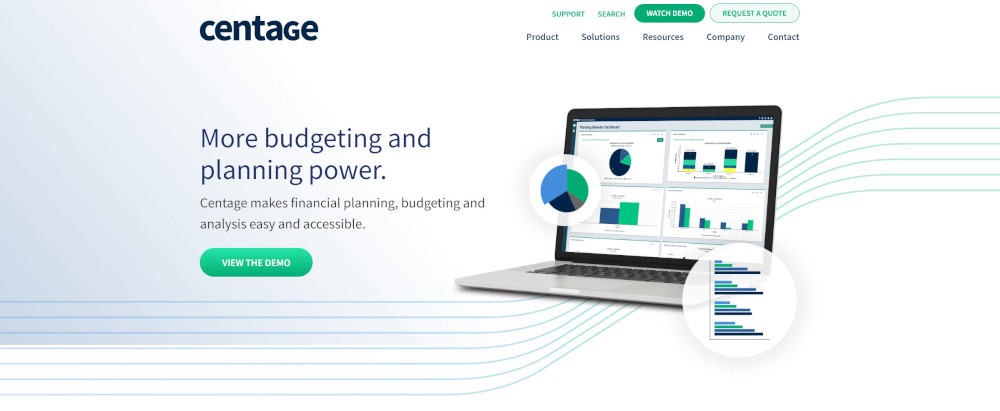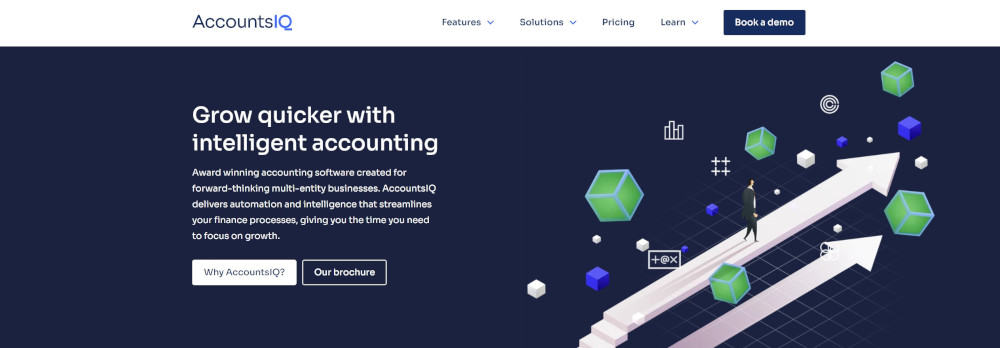How AI Can Help You Improve Your Financial Planning and Profitability
Ever pondered how artificial intelligence (AI) is reshaping the landscape of accounting and financial management?
How is it that AI, with its advanced pricing software and profitability analysis tools, is making such a significant impact, delivering enhanced client value and profitable results?
Let’s dive in and uncover the transformative power of AI in these fields.
The Role of AI in Accounting and Financial Management
In the realm of accounting and financial management, AI and machine learning are proving to be transformative forces. These technologies are not just buzzwords; they are powerful tools that are reshaping the way businesses handle their finances.
AI, with its ability to mimic human decision-making processes, is being used to automate a variety of tasks in accounting and financial management.
From bookkeeping to invoicing, from budgeting to forecasting, AI is streamlining these processes, making them more efficient and less prone to human error.
Machine Learning: The Future of Strategic Financial Decision-Making
Machine learning, a subset of AI, is particularly useful in this context. It uses statistical data to improve over time, learning from past data to make more accurate predictions about the future.
This capability is invaluable in financial management, where accurate forecasting is crucial for strategic planning and decision-making.
Financial professionals are increasingly relying on these tools to help them analyse complex patterns and trends.
Automation and Efficiency: The Power of AI in Streamlining Accounting Processes
Moreover, AI and machine learning are not just about automation and efficiency. They also provide valuable insights that can drive strategic decision-making.
For example, AI can analyse financial data to identify opportunities for cost savings or revenue growth. It can also detect anomalies that might indicate fraud or other financial risks.
In addition, AI and machine learning can enhance financial reporting. They can automate the generation of financial reports, ensuring accuracy and consistency.
They can also analyse financial data to provide insights that can be used to improve financial performance.
The Power of AI Pricing Software and Profitability Analysis Tools
AI pricing software and profitability analysis tools are at the forefront of the AI revolution in accounting and financial management.
These tools are designed to leverage the power of AI and machine learning to provide more accurate, efficient, and strategic pricing and profitability analysis.
They are capable of unifying data across disparate sources, surfacing key insights, managing unforeseen risks and increasing efficiency across a range of core functions.
Predictive Intelligence: The Key to Accurate and Efficient Pricing
One of the key benefits of AI pricing software is its ability to provide predictive intelligence. This feature allows firms to correctly scope, price, budget, resource and monitor engagements based on data-driven predictions.
This not only ensures profitable engagement management but also meets and exceeds expectations.
Analysing Profitability: Balancing Client Value and Profit Margins with AI
Profitability analysis tools, on the other hand, focus on analysing a firm’s profitability. They use AI and machine learning to analyse past data and predict future profitability scenarios.
These tools can help firms balance profitability with client value, ensuring that they deliver high-quality services while maintaining healthy profit margins.
Moreover, as these tools accrue data over time, they become increasingly intelligent. Each time data is refreshed, the AI incorporates new data points to continuously improve accuracy and reliability.
This means that the more a firm uses these tools, the more accurate and efficient they become.
5 Incredible AI-Powered Tools for Accounting and Financial Management
In my quest to find the best AI-powered accounting tools, I turned to some of the most advanced AI technologies available today: Google Bard, ChatGPT and Perplexity AI.
These AI tools have the ability to process vast amounts of information, analyse data and provide insightful recommendations, making them ideal for identifying the top accounting tools in the market.
Through this process, I discovered five incredible AI-powered accounting tools: Sage Intacct, Oracle, Centage, Botkeeper and AccountsIQ.
Each of these tools has the ability to provide solutions to the following accounting challenges.
Sage Intacct excels in core financial management, providing real-time insights and automation capabilities.

Benefits include:
- Intuitive user interface: A user-friendly interface that makes it easy to navigate and use.
- Flexible reporting: A wide range of reports that can be customised to meet your specific needs.
- Scalability: A scalable solution that can grow with your business.
Oracle, known for its comprehensive suite of applications, offers robust financial management solutions.

Benefits include:
- Powerful analytics: Powerful analytics that can help you make better business decisions.
- Global reach: A global reach, so you can be sure that your data is secure and accessible from anywhere in the world.
- Industry-specific solutions: Industry-specific solutions that can help you meet the unique needs of your business.
Centage provides budgeting and forecasting tools that help businesses plan for the future.

Benefits include:
- Affordable: An affordable solution that is a good fit for small businesses.
- Easy to use: Ease of use use and can be implemented quickly.
- Support: Excellent support that is available 24/7.
Botkeeper offers automated bookkeeping support.

Benefits include:
- Automated expense reporting: Automate expense reporting, which can save you time and hassle.
- AI-powered insights: Uses AI to provide you with insights into your finances, which can help you make better decisions.
- Scalable: A scalable solution that can grow with your business.
AccountsIQ stands out with its powerful accounting and consolidation software.

Benefits include:
- Real-time insights: Real-time insights into your finances, which allows you to make informed decisions quickly.
- Automated workflows: Automate many of your financial workflows, which can save you time and improve accuracy.
- Customizable: A customisable solution that can be tailored to meet your specific needs.
Dealing with the Administrative Tasks of Running a Business
Running a business involves a multitude of administrative tasks, such as invoicing, bookkeeping and taxes.
These tasks, while essential, can be time-consuming and prone to human error. They can also distract from more strategic tasks, such as growing the business and improving client relationships.
Errors in invoicing and bookkeeping can lead to financial losses and damaged client relationships. Inaccurate tax filings can result in penalties and legal issues.
The challenge, therefore, is to manage these tasks efficiently and accurately without diverting too much time and resources from core business activities.
The incredible AI-powered tools mentioned above can help you automate many of the administrative tasks involved in running a business.
They can automatically generate invoices based on your sales orders, reconcile your bank statements and even help with tax preparation. By automating these tasks, AI tools not only save you time but also improve accuracy, reducing the chances of costly errors.
Dealing with the administrative tasks of running a business doesn’t have to be a burden. With the right AI tools, you can automate these tasks, improve accuracy, save time and focus on what truly matters – growing your business and delivering value to your clients.
Developing Accurate Financial Forecasts and Budgets
This is a critical aspect of running a successful business.
It requires analysing past data, understanding current financial trends and making educated predictions about the future. Mistakes or inaccuracies in these forecasts and budgets can lead to poor financial decisions, wasted resources and missed opportunities.
Without accurate financial forecasts, businesses may find themselves unprepared for future challenges or unable to take advantage of emerging opportunities.
Similarly, without a well-planned budget, businesses may overspend in some areas while neglecting others, leading to imbalances and inefficiencies.
The incredible AI-powered tools mentioned above can revolutionise the way businesses develop financial forecasts and budgets.
These tools leverage AI and machine learning to analyse past data, identify trends and make accurate predictions about future financial outcomes. They provide a wide range of reports and visualisations, making it easy to understand the data and make informed decisions.
You can also view detailed budget breakdowns for different departments or projects, helping you understand where your money is going and where adjustments may be needed.
By providing accurate, data-driven forecasts and budgets, these AI tools can help you make better decisions about your business. You can identify where to invest your money, how to allocate resources, and what steps you can take to improve financial performance.
Automating Expense Reporting
Expense reporting is an essential part of financial management in any business.
Employees have to keep track of their receipts categorise their expenses and submit their reports. Managers have to review these reports, verify the expenses and approve reimbursements.
Errors or delays in this process can lead to frustration, inaccurate financial records and potential compliance issues.
Traditional methods of expense reporting often involve manual data entry and paper-based processes. These methods are prone to errors and can be time-consuming for both employees and managers.
Without a proper system in place, it can be difficult to track and manage expenses, leading to potential overspending or misuse of funds.
The incredible AI-powered tools mentioned above can help you automate expense reporting, making it easier and more efficient for everyone involved.
These tools provide a simple, easy-to-use system for employees to submit expenses. Employees can simply scan their receipts and upload them to the system. The AI tool will then automatically categorise the expenses, calculate the total amount and generate an expense report.
These AI tools not only save time and reduce the hassle of expense reporting, but they also improve accuracy and compliance. They provide real-time insights into spending patterns, helping you identify potential cost savings or areas of concern.
Expense reporting doesn’t have to be a daunting task. With the right AI tools, you can streamline this process, improve accuracy and compliance and free up time for more important tasks.
Tracking Cash Flow with AI
Cash flow management is a crucial aspect of running a successful business. It involves tracking the money coming in and going out of your business.
Lacking a comprehensive grasp of your cash flow could lead to financial hurdles, like finding yourself short of funds to meet expenses or missing out on lucrative investment opportunities.
Traditional methods of tracking cash flow often involve manual data entry and spreadsheet-based calculations. They can make it difficult to get a real-time view of your cash flow, which is essential for making timely financial decisions.
The incredible AI-powered tools mentioned above can help you track your cash flow more effectively.
These tools provide a detailed report of your incoming and outgoing cash, giving you a clear picture of your financial situation.
They can automatically categorise transactions, calculate totals and generate cash flow statements.
These AI tools also provide real-time insights, helping you identify potential cash flow problems and take corrective action.
Identifying, Assessing and Managing Financial Risks
Risks can come from various sources, such as market changes, economic fluctuations, or operational issues.
However, understanding and managing these risks can be a complex and challenging process.
Without a clear understanding of the potential risks and their impact, businesses may face financial losses, operational disruptions, or missed opportunities.
Traditional methods of risk management often involve manual data analysis and intuition-based decision-making. These methods may also lack the ability to predict future risks or to assess the potential impact of these risks accurately.
Without a systematic approach to risk management, businesses may be caught off guard by unexpected risks, leading to reactive rather than proactive decision-making.
The incredible AI-powered tools mentioned above can help you identify, assess and manage financial risks more effectively.
For instance, these tools can analyse your financial data to identify operational risks, such as cash flow problems or cost overruns.
Moreover, these AI tools can help you assess the potential impact of these risks on your business. They can simulate different scenarios, calculate potential losses and provide insights into the potential consequences of different risks.
Finally, these AI tools can help you develop plans to mitigate these risks. They can provide recommendations based on data-driven insights, helping you make informed decisions about risk management.
Ensuring Budget Compliance and Meeting Financial Goals
Ensuring budget compliance and meeting financial goals is a fundamental aspect of financial management.
It requires tracking expenses, comparing them to the budget, identifying overspending and making necessary adjustments.
Furthermore, it involves monitoring progress towards financial goals and making strategic decisions to ensure these goals are met.
Traditional methods of budget management and goal tracking often involve manual data entry, spreadsheet-based calculations and intuition-based decision-making.
These methods may fail to provide a clear picture of the department’s financial performance, making it difficult to make informed decisions and adjustments. Without a systematic approach, businesses may struggle to stay within budget and meet their financial goals, leading to financial instability and missed opportunities.
The incredible AI-powered tools mentioned above can help ensure that your department stays within budget and meets financial goals on a consistent basis.
For example, these tools can track your department’s expenses in real-time, compare them to your budget, and alert you to any areas where you may be overspending. This allows you to make timely adjustments and prevent budget overruns.
These AI tools can help you monitor your department’s progress towards its financial goals. They can generate reports that show your department’s financial performance, compare it to its goals, and identify any areas where improvement is needed.
This allows you to make strategic decisions and adjustments to ensure that your department is on track to meet its financial goals.
Conclusion
Isn’t it amazing how technology can simplify our lives?
In the world of accounting and financial management, AI and machine learning are transforming the way businesses operate.
From automating administrative tasks to developing accurate financial forecasts, AI is streamlining processes, improving accuracy and providing valuable insights.
Here’s a quick rundown of some incredible AI-powered accounting tools we’ve discovered:
These tools are designed to tackle a range of challenges.
Need to automate invoicing, bookkeeping, and taxes? Want to develop accurate financial forecasts and budgets? Looking to automate expense reporting or track cash flow?
Or perhaps you’re focused on identifying, assessing, and managing financial risks, or ensuring budget compliance and meeting financial goals?
These tools have got you covered.
But remember, before you implement AI, it’s important to check the terms and conditions of these tools, especially before submitting sensitive data or banking details.
And while these tools offer a wealth of features and benefits, this is not financial advice. It’s an overview of the platforms available to help you make an informed decision.
Ultimately, the best tool for you will depend on your specific needs and requirements. It’s important to compare the different tools and features to find the one that is the best fit for your business.
So, as you embark on your journey to find the perfect AI accounting tool, remember: it’s not just about ‘accounting’ for your finances, it’s about ‘counting’ on the right tool to make your business thrive!






